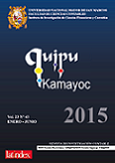REGULATORY COMPLIANCE ON CASH FLOWS FOR INDUSTRIAL COMPANIES REPORTED UNDER IFRS
DOI:
https://doi.org/10.15381/quipu.v23i43.11613Keywords:
Cash, International Financial Reporting Standards, cash flows, regulatory compliance, users of financial informationAbstract
According to accounting regulations issued in Peru by the Public Accounting Office and the Superintendence of Securities, since 2011 a mandatory adoption process started of the International Financial Reporting Stan-dards (IFRS) issued by the International Accounting Standards Board (IASB, issuing institution of the International Financial Reporting Standards- IFRS) for companies with share price, with the exception of banking, financial and insurance enterprises, and other regulated by the Superintendence of Banking and Insurance.This research work analyzed the level of compliance of industrial companies listed on the Lima Stock Exchange in the adoption of IFRS regarding the pre-sentation of the Cash Flow Statement and accounting disclosures required in notes to the financial state-ments regarding the cash flows in the period 2014. The results show that there is insufficient information and provides significant evidence of relevant normative categories over financial reporting of the cash flows that are affected in implementing IFRS.
Downloads
Downloads
Published
Issue
Section
License
Copyright (c) 2015 Percy Antonio Vílchez Olivares

This work is licensed under a Creative Commons Attribution-NonCommercial-ShareAlike 4.0 International License.
AUTHORS RETAIN THEIR RIGHTS:
a. Authors retain their trade mark rights and patent, and also on any process or procedure described in the article.
b. Authors retain their right to share, copy, distribute, perform and publicly communicate their article (eg, to place their article in an institutional repository or publish it in a book), with an acknowledgment of its initial publication in Quipukamayoc .
c. Authors retain theirs right to make a subsequent publication of their work, to use the article or any part thereof (eg a compilation of his papers, lecture notes, thesis, or a book), always indicating the source of publication (the originator of the work, journal, volume, number and date).





























